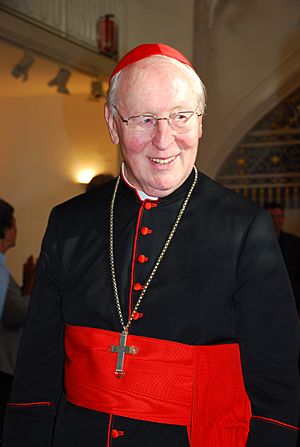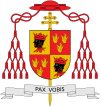Friedrich Wetter facts for kids
Quick facts for kids His Eminence Friedrich Wetter |
|
|---|---|
| Cardinal, Archbishop Emeritus of Munich and Freising |
|
 |
|
| Church | Catholic Church |
| Archdiocese | Munich and Freising |
| See | Munich and Freising |
| Appointed | 28 October 1982 |
| Enthroned | 12 December 1982 |
| Reign ended | 2 February 2007 |
| Predecessor | Joseph Ratzinger |
| Successor | Reinhard Marx |
| Other posts | Cardinal Priest of Santo Stephano in Coelio Monte (1985–) |
| Orders | |
| Ordination | 10 October 1953 |
| Consecration | 29 June 1968 by Isidor Markus Emanuel |
| Created Cardinal | 25 May 1985 |
| Rank | Cardinal-Priest |
| Personal details | |
| Born | 20 February 1928 Landau, Germany |
| Denomination | Catholic |
| Previous post |
|
| Alma mater |
|
| Motto | Pax Vobis ("Peace to you") |
| Coat of arms |  |
| Styles of Friedrich Wetter |
|
|---|---|
 |
|
| Reference style | His Eminence |
| Spoken style | Your Eminence |
| Informal style | Cardinal |
| See | Munich and Freising (emeritus) |
Friedrich Wetter was born on February 20, 1928. He is a German cardinal in the Catholic Church. A cardinal is a very important leader in the Catholic Church, chosen by the Pope.
He served as the Archbishop of Munich and Freising in Germany. He held this important role from 1982 until 2007. Before that, he was the Bishop of Speyer from 1968 to 1982. He became a cardinal in 1985.
Contents
Early Life and Education
Friedrich Wetter was born in Landau, Germany. He began his studies there. From 1948 to 1956, he studied at two special universities. These were the Sankt Georgen Graduate School of Philosophy and Theology and the Pontifical Gregorian University in Rome. He earned a high degree in theology from the Gregorian University.
In 1953, he became a priest in Rome. Cardinal Clemente Micara performed his ordination.
Early Career as a Priest
After becoming a priest, Wetter worked as a chaplain in Speyer from 1956 to 1958. He then taught at the seminary in Speyer for two years. A seminary is a school where people study to become priests.
For one year, he was an assistant parish priest in Glanmünchweiler. Later, he became a professor. He taught theology in Eichstätt from 1962 to 1967. In 1967, he taught at the Johannes Gutenberg University of Mainz for a year.
Becoming a Bishop and Cardinal
On May 28, 1968, Pope Paul VI chose Friedrich Wetter to be the Bishop of Speyer. He officially became a bishop on June 29, 1968. Bishop Isidor Markus Emanuel, who was the previous bishop of Speyer, led the ceremony.
Leading the Archdiocese of Munich and Freising
Pope John Paul II appointed him Archbishop of Munich and Freising on October 28, 1982. He officially started his new role on December 12, 1982.
While he was Archbishop, he led the Freising Bishops Conference. He also chaired the faith commission of the German Bishops' Conference from 1981 to 2008. This group helps guide the Catholic Church in Germany.
Pope John Paul II made him a cardinal on May 25, 1985. He was given the title of Cardinal-Priest of Santo Stefano Rotondo.
Later Years and Retirement
In October 2004, Cardinal Wetter spoke out about a situation involving Rocco Buttiglione. Buttiglione was nominated for a position in the European Commission. Some people objected to his appointment because of his personal views. Cardinal Wetter felt that these objections showed a bias against Catholics. He pointed out that important founders of the European Union were Catholic.
Cardinal Wetter was one of the cardinals who helped choose the new Pope in 2005. This meeting is called a papal conclave. They elected Pope Benedict XVI.
Pope Benedict XVI accepted Cardinal Wetter's resignation on February 2, 2007. Even after resigning, he continued to help lead the archdiocese. He served as an apostolic administrator until Reinhard Marx became the new Archbishop on February 2, 2008.
In January 2022, a report looked into how cases of difficult situations were handled in the Munich archdiocese. Cardinal Wetter admitted that he could have done better in some cases. He apologized for not fully understanding how these situations affected people and their families.
See also
 In Spanish: Friedrich Wetter para niños
In Spanish: Friedrich Wetter para niños
- Cardinals created by John Paul II
 | Aaron Henry |
 | T. R. M. Howard |
 | Jesse Jackson |

